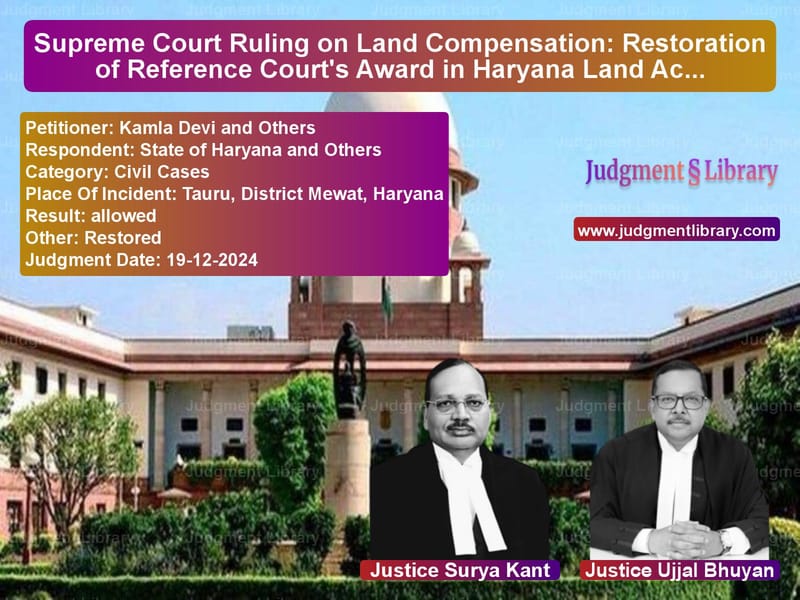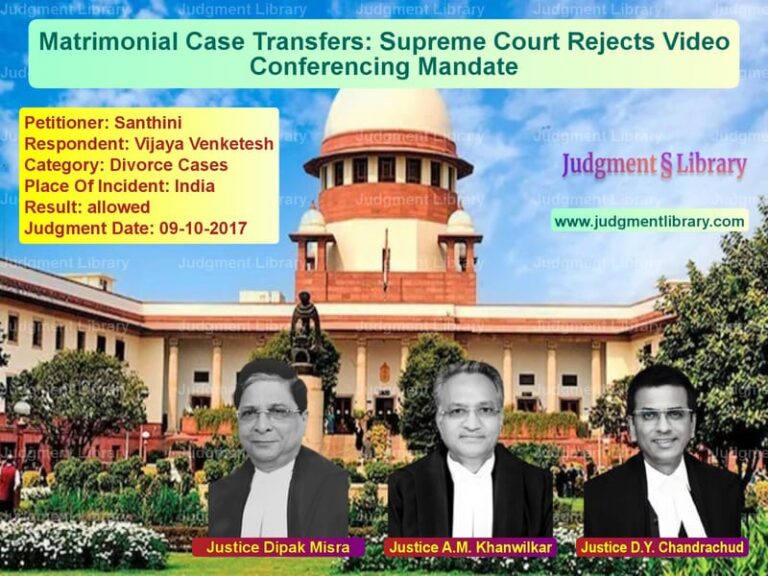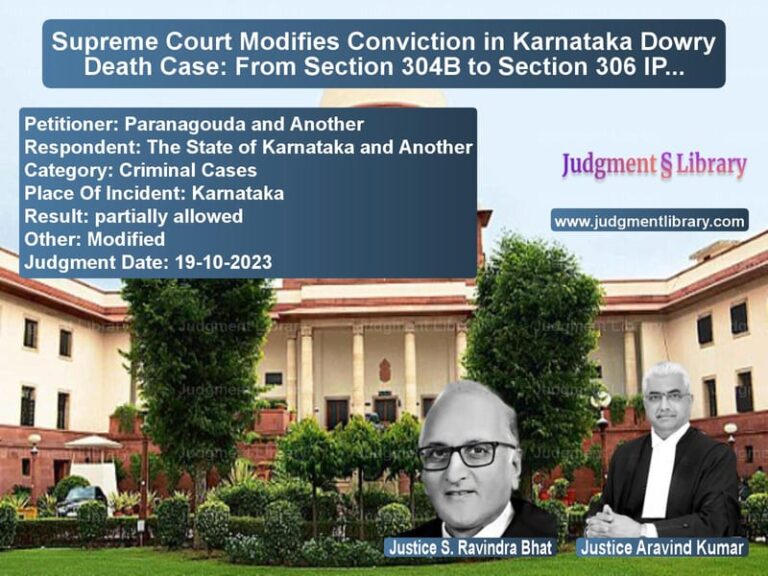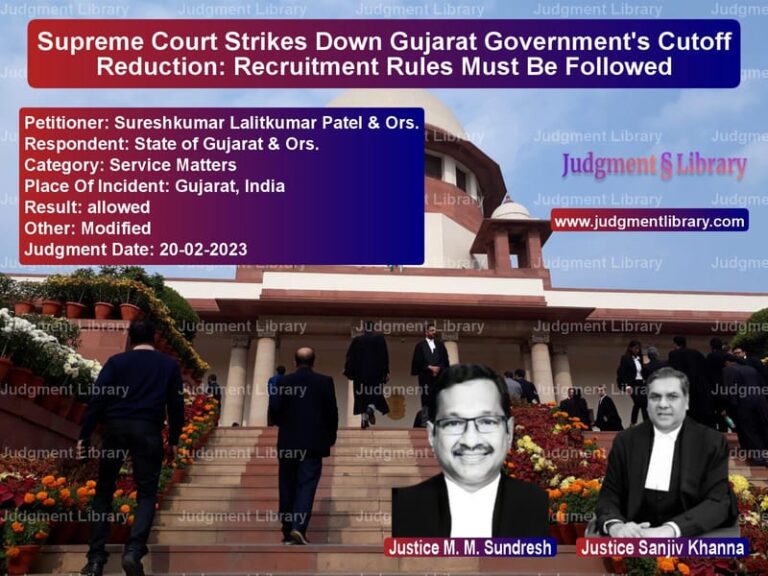Supreme Court Ruling on Land Compensation: Restoration of Reference Court’s Award in Haryana Land Acquisition Case
The Supreme Court of India, in the case of Kamla Devi and Others vs. State of Haryana and Others, delivered a significant judgment on December 20, 2024, regarding land compensation in the village of Tauru, District Mewat, Haryana. The Court addressed the issue of fair compensation for land acquired by the State under the Land Acquisition Act, 1894, in 2011 and 2012, reaffirming the importance of adhering to fair market valuation and the Reference Court’s assessment.
Background of the Case
The dispute in this case arose from land acquisition notifications issued by the State of Haryana for a public project in 2011 and 2012. The landowners, led by Kamla Devi, contested the compensation awarded by the Land Acquisition Collector (LAC) and sought higher compensation. The case concerns lands in village Tauru, District Mewat, which were acquired under Section 4 and 6 of the Land Acquisition Act, 1894, with notifications issued on February 11, 2011, and February 10, 2012 respectively.
The petitioners filed a Reference under Section 18 of the Land Acquisition Act for a higher compensation, which was adjudicated by the Reference Court. The Reference Court awarded a compensation amount based on market valuation, taking into account the land’s potential for commercial development and relevant sale exemplars. However, the High Court of Haryana, in its judgment dated August 23, 2022, reduced the compensation awarded by the Reference Court, leading to this appeal in the Supreme Court.
Legal Issues Raised
- Whether the compensation awarded by the Reference Court was adequate and aligned with the market value of the land.
- Whether the High Court erred in reducing the valuation of the land and affirming the lower compensation granted by the Land Acquisition Collector.
- What is the appropriate methodology for valuing agricultural and potentially commercial land for compensation under the Land Acquisition Act?
Arguments Presented
Arguments by the Appellants (Landowners)
- The landowners argued that the compensation awarded by the LAC was too low and did not reflect the true market value of the land.
- They contended that the Reference Court’s valuation was based on appropriate market exemplars and took into account the land’s potential for commercial development, which the LAC had ignored.
- The appellants emphasized that the High Court’s reduction of the compensation was unjustified, as it did not consider the full potential of the land in the evolving real estate market of Mewat.
- The landowners requested that the Supreme Court restore the full compensation as awarded by the Reference Court, along with interest and other statutory benefits.
Arguments by the Respondents (State of Haryana and Others)
- The respondents argued that the compensation awarded by the LAC was in line with the prevailing market rates at the time of acquisition.
- They maintained that the Reference Court’s valuation was based on outdated or not fully representative sale exemplars, and the High Court had rightly reduced the compensation to align it with the reality of the market.
- The respondents also contended that the appellants had not demonstrated any specific legal error in the High Court’s judgment and that the compensation as revised was fair.
Supreme Court’s Observations
On the Market Value and Fair Compensation
The Supreme Court emphasized the importance of fair market valuation and the relevance of sale exemplars in determining compensation. The Court reiterated the principles laid down in Horrmal v. State of Haryana (2024), where it had restored the compensation based on a fair evaluation of the market value of the land. The Court observed:
“The Court must ensure that landowners are compensated adequately based on the market potential of the land at the time of acquisition. The mere existence of sale deeds is not sufficient; the market conditions, land’s potential for development, and other economic factors must be considered.”
On the High Court’s Error in Reducing Compensation
The Supreme Court found that the High Court had erred in reducing the compensation amount granted by the Reference Court, stating that:
“The High Court’s decision to reduce the valuation of the land was not based on a thorough examination of the sale exemplars or the true market conditions. The Reference Court’s valuation, which relied on sale deeds that reflected the land’s potential for future development, was more accurate and in line with the principles of compensation under the Land Acquisition Act.”
The Court emphasized that the compensation awarded by the Reference Court was justified and restored it in full, along with interest as provided for under the Land Acquisition Act.
On Interest and Statutory Benefits
The Court held that the landowners were entitled to interest on the compensation amount from the date of acquisition until the date of payment, as well as any other statutory benefits under the Land Acquisition Act:
“The compensation, along with statutory interest and other benefits, should be paid to the appellants within eight weeks from today, as per the Reference Court’s award.”
Final Verdict
- The Supreme Court allowed the appeal and restored the compensation amount as awarded by the Reference Court, which had been reduced by the High Court.
- The Court directed the respondents to pay the compensation amount to the appellants along with statutory benefits, including interest, within eight weeks.
- The Supreme Court reiterated the importance of fair valuation in land acquisition cases and emphasized that the market potential of the land must be given due consideration in compensation assessments.
Implications of the Judgment
- Restoration of Fair Compensation: The judgment underscores the importance of fair compensation in land acquisition cases, ensuring that landowners are not shortchanged in terms of the value of their property.
- Landowners’ Rights Protected: The ruling protects the rights of landowners, ensuring they are compensated adequately based on the market conditions at the time of acquisition.
- Precedent for Future Compensation Cases: This decision sets a precedent for future land acquisition compensation cases, highlighting the need for proper consideration of market value and potential development.
- Judicial Oversight on Government Decisions: The judgment also highlights the role of the judiciary in ensuring that compensation assessments by government bodies are fair and transparent, upholding the rights of landowners.
This ruling reinforces the constitutional protection of property rights and ensures that landowners receive due compensation for their land, based on the actual market value and development potential.
Petitioner Name: Kamla Devi and Others.Respondent Name: State of Haryana and Others.Judgment By: Justice Surya Kant, Justice Ujjal Bhuyan.Place Of Incident: Tauru, District Mewat, Haryana.Judgment Date: 19-12-2024.
Don’t miss out on the full details! Download the complete judgment in PDF format below and gain valuable insights instantly!
Download Judgment: kamla-devi-and-other-vs-state-of-haryana-and-supreme-court-of-india-judgment-dated-19-12-2024.pdf
Directly Download Judgment: Directly download this Judgment
See all petitions in Property Disputes
See all petitions in Damages and Compensation
See all petitions in Landlord-Tenant Disputes
See all petitions in Judgment by Surya Kant
See all petitions in Judgment by Ujjal Bhuyan
See all petitions in allowed
See all petitions in Restored
See all petitions in supreme court of India judgments December 2024
See all petitions in 2024 judgments
See all posts in Civil Cases Category
See all allowed petitions in Civil Cases Category
See all Dismissed petitions in Civil Cases Category
See all partially allowed petitions in Civil Cases Category







